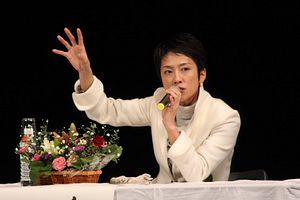On July 27, Democratic Party (DP) chief Renho Murata (more commonly known as just Renho) announced that she would be stepping down as party leader. The move followed the announcement by the party’s secretary-general Yoshihiko Noda of his resignation several days earlier, and effectively represents a change in the DP’s executive team.
Overseas observers could be forgiven for thinking that the scandals of the last few months have been hard on Prime Minister Shinzo Abe of the ruling Liberal Democratic Party (LDP) and his government. As Japan’s main opposition party, the DP’s first priority should have been attacking the LDP. So why the pressure to change leaders?
Since it was formed in 2012, the Abe administration has enjoyed remarkably impressive approval ratings. However, in the Tokyo metropolitan assembly elections in early July, the party suffered an historic defeat. The tide had begun to turn, with the administration’s approval rating dipping below 30 percent for the first time. One cause was the public’s view that Abe has failed to properly respond to several scandals. He faced harsh criticism over the government’s approval of a new school and a minister’s explanation of how information was managed with regard to SDF peacekeeping forces deployed overseas. These scandals eroded public trust in Abe and his cabinet, and led to sliding approval ratings.
But criticism of the Abe administration did not translate into growing support for the Democratic Party. Take those Tokyo metropolitan assembly elections, for instance – even here, the DP lost seats. It was the Tomin First no Kai (Tokyoites First), a regional conservative political party led by Tokyo Governor Yuriko Koike, that was the main winner. Tomin First won the election by attracting votes from conservative voters who had previously supported the LDP but had become critical of the Abe administration. However, Tomin First is a local party with no footprint in the National Diet. Indeed, it has staked out the same position on constitutional reform that the LDP has. In other words, for now at least Tomin First does not represent opposition to the LDP on the national political stage.
In another development, Komeito, which is in a coalition cabinet with the LDP, broke away from the LDP in the Tokyo metropolitan assembly elections and instead teamed up with Tomin First. As a result, it succeeded in increasing the number of seats it holds in the Tokyo metropolitan assembly. Despite this, in national politics Komeito is not at all opposed to joining with the LDP, as the nation’s ruling party.
As this turn of events shows, the present Japanese political climate has involved conservatives critical of the Abe administration directing their support to Tomin First in the Tokyo elections, but on the national stage, there is no natural alternative for conservatives unhappy with Abe and his government. And it is for that reason that there is very little chance of a change of government in Japan in the immediate future.
On nuclear issues and security-related legislation, the DP has joined with the Japanese Communist Party (JCP) in attacking the Abe administration. Within the DP itself, though, numerous members are themselves hawkish on security issues, and the extreme anti-conservative stance adopted by the previous and current leadership may have actually cost the party support. The DP may also have realized that hostility towards the Abe administration does not automatically translate into more support for the DP. Traditionally, conservatives and other voters unhappy with the Abe administration should have turned to the DP, but the DP has failed to be the alternative they seek. That arguably explains the resignations of Renho and Noda.
Japanese politics can be perplexing even for Japanese, and when news is published overseas, it is often quite watered down. It is understandable, then, that overseas readers may puzzle at the resignation of the leading opposition party figures at a time when the Abe administration itself is under fire. Perhaps the above explanation helps provide an answer.
Shin Kawashima is a professor at the University of Tokyo.

































